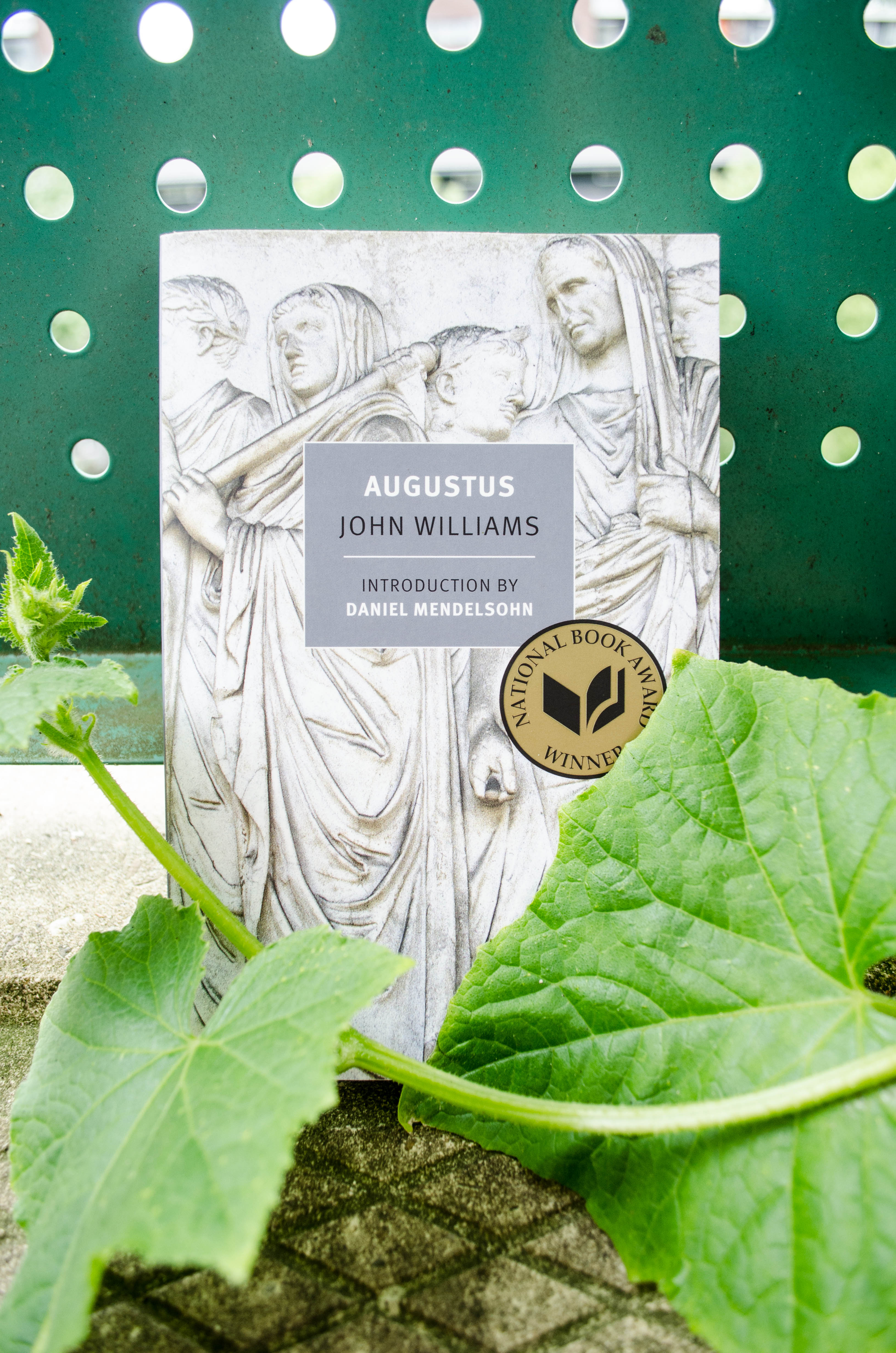Just finished
Augustus by John Williams
 Book club selection this month was an unlikely choice. I’m grateful for the diversion off our typical, contemporary path because I definitely would never have picked up this book otherwise. My knowledge of Roman history is spotty at best (largely informed by Shakespeare), so I didn’t know the story or importance of Augustus the guy before reading this book. If I’m being honest, I don’t really know the story or importance of Augustus the guy after having read it either. Which is not to say I didn’t enjoy it. I took it at face-value and it really holds up on its own as a piece of fiction writing. It’s comprised of letters, journal entries, edicts and memoirs from the people surrounding Augustus, leading up to and during his reign. The prose is beautifully written and Williams does a masterful job at differentiating the many voices of characters through their writing style. The book is mostly well-paced, but seemed to lose steam as it ended. Augustus’s is the penultimate voice you hear in the book, and his perspective isn’t given until that point. At first I liked the restraint that resulted from estimating the make of a man via reflection of his relationships with others, but the conceit dragged on a bit too long for me and, towards the end, started to feel coy and overwrought instead of clever. As much as I enjoyed the writing, I wasn’t left with any strong revelatory feelings about Augustus. Maybe that was the point? It felt like the book did a lot of telling-not-showing about how greatness is or isn’t shaped by destiny, but my main takeaway was more related to the concept of identity, and how it’s externally rather than internally formed. This seems to be William’s third best-acclaimed classic novel of three, despite having won the National Book Award in 1973. I think that’s a result of the genre and form – epistolary historical fiction isn’t everyone’s bag. His other two, Butcher’s Crossing
Book club selection this month was an unlikely choice. I’m grateful for the diversion off our typical, contemporary path because I definitely would never have picked up this book otherwise. My knowledge of Roman history is spotty at best (largely informed by Shakespeare), so I didn’t know the story or importance of Augustus the guy before reading this book. If I’m being honest, I don’t really know the story or importance of Augustus the guy after having read it either. Which is not to say I didn’t enjoy it. I took it at face-value and it really holds up on its own as a piece of fiction writing. It’s comprised of letters, journal entries, edicts and memoirs from the people surrounding Augustus, leading up to and during his reign. The prose is beautifully written and Williams does a masterful job at differentiating the many voices of characters through their writing style. The book is mostly well-paced, but seemed to lose steam as it ended. Augustus’s is the penultimate voice you hear in the book, and his perspective isn’t given until that point. At first I liked the restraint that resulted from estimating the make of a man via reflection of his relationships with others, but the conceit dragged on a bit too long for me and, towards the end, started to feel coy and overwrought instead of clever. As much as I enjoyed the writing, I wasn’t left with any strong revelatory feelings about Augustus. Maybe that was the point? It felt like the book did a lot of telling-not-showing about how greatness is or isn’t shaped by destiny, but my main takeaway was more related to the concept of identity, and how it’s externally rather than internally formed. This seems to be William’s third best-acclaimed classic novel of three, despite having won the National Book Award in 1973. I think that’s a result of the genre and form – epistolary historical fiction isn’t everyone’s bag. His other two, Butcher’s Crossing and Stoner
, are ostensibly more traditionally told. Given how much I enjoyed Williams’s prose in this funky format, I might have to go back and check out his more novelly novels.
 Voor altijd samen, amen by Guus Kuijer
Voor altijd samen, amen by Guus Kuijer
I really enjoyed this sweet and quirky middle grade chapter book. I vowed to read at least 1-2 chapters every day but found myself wanting to read farther beyond my self-imposed milestone. I borrowed this from the library with purely scholarly pursuits in mind. My Dutch teacher had recommended it as a good way to practice. That I ended up enjoying it is going to make the following four books in the Polleke series a much easier challenge than I had anticipated. Polleke is a passionate girl with a crazy family and a great sense of humor. She’s only 11, but Polleke takes on a lot of complicated themes – racism, homosexuality, drug abuse, IVF, homelessness, divorce – with earnestness and levity. Genuinely looking forward to seeing what happens to her next.
Currently reading
Alias Grace by Margaret Atwood
I’m not sure how I’ve gotten through more than 30 years of existence without having read any books by Margaret Atwood, but there you are. I would have started with something a little more predictable, like The Handmaid’s Tale or The Blind Assassin
, but it was Alias Grace that showed up in a tiny free public library. Alias Grace takes place in the mid-late 19th century, which has enough inherent creepiness as an era to serve as a perfect setting for a story about a famous murderess, Grace Marks. I’m speeding through this one, gobbling up the descriptions of clothing, stories about immigration by ship, spiritualism, servitude, insane asylums, and all the other rich atmospheric details that help to build the suspense. I’m pretty sure she did it (I kind of hope she did it), and watching Grace interact with her own fractured inner thoughts is fascinating.
On the horizon
I bought a stack of books a few months ago that I’ve been savoring as slowly as possible. Next up from that batch is The Sympathizer by Viet Thanh Nguyen. I don’t know much about it other than that it won the 2016 Pulitzer Prize and is supposed to be written in absurdist and stylized prose, telling the story of a communist sleeper agent in America after the Vietnam War. My feelings about being an American have become even more complicated and ambivalent lately, so I’m ready and eager to take this one on and crack my patriotic identity wide open.